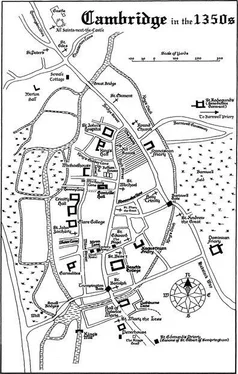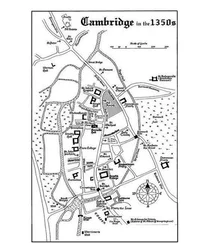Susanna Gregory
THE DEVIL'S DISCIPLES
2008

Cambridge, Ascension Day Eve (early June) 1357
It was almost a decade since the plague had swept across the country, snatching the lives of rich and poor, young and old, good folk and bad. Father Thomas would never forget the terror of not knowing who might be struck next, or of watching his fellow Franciscans die, one after the other. At first, the friars had believed they would be spared, because the Great Pestilence would only punish the wicked, but they could not have been more wrong. Indeed, a greater proportion of priests had died than laymen, a fact that had not been lost on the general populace. More than half of Cambridge’s clerics had perished in those awful months.
But Thomas had survived. Unlike many of his brethren, he took his priestly vows seriously, and never let himself stray from the straight and narrow. When they bought themselves warm cloaks and good boots, he embraced poverty. When they pampered themselves with fine food, wine and even women, he piously declared that he had sworn to live a life of chastity and obedience. And when the plague had descended on Cambridge, he had gone among the sick and dying, giving aid where he could. He had been spared, which he put down to the fact that he was an upright, God-fearing man, and when the disease had finally relinquished its hold on the little Fen-edge town, he made sure everyone knew it.
In the years that followed, he preached fervently about the dangers of sin. People had listened at first, but as time rolled on and the hideous memories began to fade, they slowly slid back into their old ways. Thomas was on the verge of giving up – let the Devil have their rotten souls, if that was what they wanted – but then he had met a fellow Franciscan named Edmund Mildenale. Mildenale had a single message: unless people repented, the Death would return, sweeping away evildoers so only the righteous would be left. Thomas was delighted. Mildenale’s warnings matched exactly what he had been saying for the past nine years, and he spoke with a fiery conviction that was wonderful to hear. Thomas immediately joined ranks with him.
Mildenale liked to hold forth in the open air, rather than the more formal setting of a church, and encouraged his friends to do likewise. So, that morning Thomas was standing on a water-trough behind St Mary the Great, regaling passers-by with a description of what they would suffer in Hell unless they renounced evil. No one was taking much notice, which was annoying. Why could they not see that his message was important? Were they really so stupid? Then David and Joan Refham began to heckle him. Thomas loathed the Refhams – a coven of witches met in the abandoned church of All Saints-next-the-Castle on Sunday nights, and he was sure they were members.
‘God did not help the faithful when the plague came last time,’ Joan shouted challengingly. ‘So why should we waste our time in churches now? Besides, sinning is a lot more fun than praying.’
‘The Sorcerer will save us if the pestilence comes again, anyway,’ declared Refham. ‘He told us so himself, and I trust him a lot more than I trust your fickle God.’
Thomas was horrified by the number of passers-by who seemed to be nodding agreement. ‘But the Sorcerer is a warlock,’ he cried, aghast. ‘He draws his strength from Satan.’
‘Well, at least Satan listens,’ countered Refham, beginning to walk away, bored with the debate. ‘Which is more than can be said for God and His so-called saints.’
The exchange shocked Thomas, and he stopped sermonising to reflect on the growing popularity of the man everyone was calling the Sorcerer. At first, there had been nothing to distinguish him from the many other black-hearted rogues who convened sordid little gatherings in the depths of the night. All claimed they were better than the Church, and that their gods were stronger. But then tales began to circulate that the Sorcerer could heal the sick, provide protection against bad luck, and even grant wishes. Thomas grimaced. He and Mildenale had tried hard to find out the villain’s real name, but the fellow was a master at keeping his identity secret – he wore a mask when he presided at his unholy gatherings, and he seemed to vanish into thin air the moment they were over. And it was difficult to fight a man who declined to show himself.
‘Witchery is popular in the town at the moment, Father,’ said Prior Pechem, seeing Thomas’s disconsolate expression as he strolled past. Pechem was head of the Cambridge Franciscans, although Thomas did not respect him. How could he, when Pechem declined to take a firm stance against sin? ‘The Sorcerer is good at curing warts, and people admire him for that alone. But his star will fade – his kind always does – and the Church will be there to round up those who have strayed. Do not fret.’
But Thomas did fret, and thought Pechem a fool for underestimating the risk the Sorcerer posed. ‘It may be too late by then,’ he snapped. ‘The Devil will–’
‘I wrote to our Franciscan brethren in London, as you asked,’ said Pechem, interrupting hastily before Thomas could work himself into a frenzy. ‘As soon as I receive the answer to your question, I shall let you know. Of course, I am sure you are mistaken.’
‘So you have said before, but I want to be certain.’ Thomas began to speak more loudly, eager to make sure Pechem understood. ‘Satan is all around us, and we must do everything to–’
‘Quite so, quite so,’ mumbled Pechem. ‘Good morning to you.’
And then he was gone, reluctant to stand around when Thomas resumed his harangue, lest people thought he condoned the sentiments expressed in it. Thomas glared at his retreating back, then decided to abandon his efforts for the day. Refham’s mention of the Sorcerer had unsettled him, and he found he was not in the mood for an impassioned tirade. He began to make his way home.
As he passed St Michael’s Church, a solemn procession emerged. The scholars of Michaelhouse had been praying for Margery Sewale, dead after a long illness. The College was the sole beneficiary of her will, and the Master was going to bury her the following morning. She had chosen an auspicious time to die, because the morrow was Ascension Day, and everyone knew that folk put in the ground on Ascension tended to spend less time in Purgatory than folk buried on other days.
Michaelhouse was Mildenale’s College, so Thomas looked for him among the mourners. He saw him walking at the back of the procession, talking to two more Franciscans – Father William and Roger Carton. Thomas nodded amiably to Mildenale and Carton, although he greeted William rather more coolly. William had argued violently with him the previous evening, and hurtful remarks had been made on both sides.
He had not gone much further along the High Street when he felt a sudden, searing pain in his head. Then something struck his cheek, and he realised he had fallen face-down on the ground. Panicky voices rattled around him, echoing and distorted, but he recognised William’s strident tones and Mildenale’s softer ones. Then another joined in, this one calm, authoritative and reassuring. It was Doctor Bartholomew, Michaelhouse’s physician, saying something about a thrown stone. Thomas raised a hand to his aching temple and felt a cut. Someone had lobbed a missile at him!
‘It was a Dominican,’ declared Father William furiously. William hated Dominicans, and blamed them for everything that went wrong, from bringing the plague to curdling his milk.
Читать дальше













